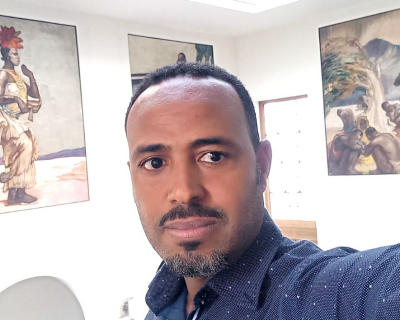Write your Paper based on Demographic and Health Survey (DHS) Data on Sexual, Reproductive and Child Health
-
Modules
-
Distance learning + Face-to-face
-
Antwerp, Belgium
-
5 ECTS Credits
-
English
-
-

Olalekan Olagunju
Nigeria
In early 2025, I participated in the short course “Write Your Paper Based on Demographic and Health Survey (DHS) Data on Sexual, Reproductive, and Child Health.” The course offered an exceptional opportunity to strengthen my analytical skills and deepen my understanding of the DHS dataset, a resource that plays a central role in the work we do at my organization.
At Maternal and Reproductive Health Collective (www.mrhcollective.org), our mission focuses on improving maternal and neonatal health in Nigeria by identifying vulnerable pregnant women in underserved communities, linking them to nearby healthcare facilities, and following up with them throughout pregnancy. I wanted my research to provide a fresh perspective, one that could offer greater policy relevance and practical application. This led me to focus on spatial variations in ANC4+ (i.e., pregnant women receiving 4 or more antenatal care visits) coverage across the Lagos conurbation, a novel approach that introduced me to the complex world of geospatial analysis.
After the one-week face-to-face DHS training, I realized that the technical demands of my chosen research topic could benefit from an extension to explore a geospatial dimension, so I remained for two additional weeks. This way I got an immersion in advanced geospatial methods and analytical tools, which included preparing DHS and spatial datasets for geospatial modeling, designing spatial grids for pixel-level analysis, integrating external spatial datasets (e.g., friction surfaces for travel time), handling raster and vector geospatial data formats, applying Model-Based Geostatistics for spatial prediction, extracting and interpreting spatial statistics, and creating high-resolution spatial maps. Among the general skills, I worked extensively with R statistical software, used advanced Stata code for data preparation and multivariable analysis, and practiced writing scientific manuscripts using appropriate geospatial language and structure.
The extended face-to-face learning period was essential for me to master these concepts, especially as I had limited prior exposure to geospatial methods. I also really appreciated the hands-on nature of the extra training. Participating in the DHS 2025 cohort has opened a new dimension in my approach to maternal and reproductive health research; one that integrates spatial thinking with data-driven decision-making for better health outcomes.

Worku Dechassa
Ethiopia
The DHS course itself was highly advanced and stimulating, but I realized I needed more time to understand the complexities of geospatial analysis and fully explore and complete all aspects of spatial data management, analysis, and interpretation. Spending three weeks in the face-to-face track at ITM was a transformative journey that deepened my technical skills, expanded my global health perspective, and filled my heart with inspiration. In particular, I had the opportunity to enhance my skills in spatial analysis, small area estimation, and model-based geostatistics. A key highlight of the course was the opportunity to write my research paper, utilising DHS data to transform complex datasets into actionable insights. Through hands-on practice using Stata, R, and QGIS, I learned to manage various types of data and software workflows—a valuable skill set I will carry forward in my research career.
The learning environment was both fast-paced and immersive—challenging in all the right ways and incredibly rewarding. ITM is a centre of excellence not only because of its academic rigor but also because of its people. Many exceptional faculty and staff left a lasting impression: (i) Prof Lenka Benova was a true mother figure to us all — kind, generous, and deeply committed to the growth of every student, with an evident passion for public health and human development; (ii) Dr Peter Macharia, a master of spatial analysis whose ability to transform raw data into visually stunning and meaningful maps made learning a joy; (iii) and the purpose-driven and visionary Dr Anteneh Asefa, who walked with us every step of the way, showing us how advanced analytics can be applied with purpose and clarity.
Beyond the classroom, Antwerp itself added magic to the experience -- a city with old-world charm and quiet confidence. ITM is rich in history, high in quality, and rooted in professionalism. We built not only skills, but also a mindset geared toward taking what we’ve learned back home to support our fellow professionals.

Gaëlle Sehi
Ivory Coast
I chose ITM for my studies because of the unique opportunities it provides. I am currently a PhD student at the University of California, Irvine, and I recognised the importance of gaining experience in analysing and utilizing DHS data for my research endeavours and PhD dissertation. Specifically, my interests lie in understanding healthcare accessibility and the consequences of inadequate healthcare access, particularly in West Africa and my home country, Côte d'Ivoire. That's why I eagerly enrolled in the Write Your Paper Based on Demographic and Health Survey (DHS) Data on Reproductive and Child Health course. I knew that participating in this workshop would significantly benefit my PhD studies and contribute to my future career aspirations. It would enhance my skills in presenting research findings and writing high-quality publishable papers or manuscripts based on DHS data.
There were several aspects that I genuinely liked and found beneficial in the course. Firstly, the support system provided was exceptional. The instructors and fellow participants created a collaborative and encouraging environment, which allowed us to freely engage in discussions, seek clarification, and share insights. This support system fostered a sense of camaraderie and made the learning experience enjoyable. Additionally, the course provided a conducive environment for conducting our analyses. There sources and tools available were comprehensive and well-suited for our research needs. This facilitated efficient data analysis and enabled us to explore different methodologies effectively. The practical nature of the course, coupled with the availability of necessary resources, contributed to a productive learning environment.
As a result of these factors, I felt incredibly productive throughout the course. The combination of a supportive community and an enabling environment allowed me to make significant progress in my research. It motivated me to actively participate, ask questions, and delve deeper into the subject matter. Overall, I thoroughly appreciated the positive atmosphere, the opportunity to run analyses, and the ability to engage in fruitful discussions.
The course has significantly benefited my future career by equipping me with essential skills and knowledge in utilizing DHS data. It has enhanced my research and analytical abilities while expanding my professional network. Overall, it has positioned me well for making valuable contributions in the fields of spatial epidemiology and maternal & child health.

Daniel Zaake
Uganda
I am an obstetrician-gynaecologist, currently pursuing a PhD at Uganda’s Makerere University. My research focuses on understanding what leads to infertility in Uganda. In my clinical work at St Francis Hospital Nsambya hospital I have been noticing a rise in infertility in the past decades; it affects roughly six to 10 per cent of the couples. To be able to tackle this issue, we need to understand the magnitude of the problem in the country, how it is distributed in the country and the underlying reasons. I heard about ITM’s DHS course from an alumnus, who did the course the previous year. I believe that this short course will help me to better analyse data: I am currently focusing on DHS surveys from 2011-2016 with a very large dataset; there were 19,088 female participants were interviewed in different parts of the country, so it gives a comprehensive overview.
In addition to helping with my own research, the course will also be useful in my teaching work at Uganda Martyrs University, Mother Kevin Postgraduate school at Nsambya. I hope to pass on what I have learned to my students.
My fellow DHS course mates and coaches have been very supportive. For a clinician, working with researchers and demographers in this new field of DHS was very exciting. The coaches were very knowledgeable of the subject matter and they had a great way of explaining the difficult subjects. They were also very accessible to us. The on-site, face-to-face week on the beautiful ITM campus was a winner. Meeting the coaches in person was a humbling and very enriching experience.

Ndèye Awa Fall
Senegal
I work as a research officer at the African Population and Health Research Center (APHRC) West Africa Regional Office in Senegal, where I am involved in various projects on adolescent and women health, for example Countdown 2030. I heard about the DHS course from our executive director at APHRC, who shared it with the whole staff. I am really happy that I took this course because I gained more confidence in analysing data, which is crucial for my professional duties. I am working on a dataset from 2014-2019 which involves thousands of respondents and I am trying to analyse if the knowledge of adolescents about contraception improved within this timeframe.
The final objective of the course is to have an a publishable research paper which we can submit to a scientific journal, and it will be the first time I am the first author of a paper, so it’s a very exciting opportunity. I am currently pursuing a PhD degree in health geography at Gaston Berger University (Saint-Louis, Senegal), and the methodology I learned in this course will surely be applicable in my research.